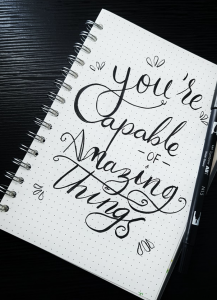How often do you feel really, truly good about who you are? Do you feel like you deserve the best? Are you proud of your accomplishments and who you have become? Do you feel good when you look yourself in the eye? Are you confident that you can tackle the next challenge that is thrown at you?
Or, do you wake up feeling regretful? Are you always looking for things you can change about yourself or your life? Are you “not good enough” for the promotion or the relationship? Do you slink down the corner of the room during meetings or family events?
Self-esteem, or self-worth, is the way you feel about yourself. It is defined in the dictionary as “a feeling that you are a good person who deserves to be treated with respect.” Sounds simple enough doesn’t it? But, if you are a person who has struggled with self-worth you know it is much more complicated.

Putting Yourself First
As adults, we often put ourselves last. We are so focused on taking care of everyone else, meeting the demands of the office, the home, and the family that we put our priorities last. We struggle to find time to do the things that would improve our self-esteem. Yet, with better self-esteem, we would be better at all the other things we do in our lives because we would feel better overall.
Low self-esteem impacts almost all facets of our life— our work, our relationships, our health.
How can you improve self-esteem?
1.) Identify and Challenge Negative Self-Talk — What are you saying to yourself? What do you believe to be true about yourself? For example, “I have no friends,” “I am not smart enough,” “I am ugly,” etc. Write them down and then list why they are not true. You might list a couple of friends that you do have, or ways you are smart, and things you like about yourself.

2.) Identify the Positives — Similar to the above exercise, think about all the good things about yourself. What are some nice things people have said about you? What are some of your positive qualities — are you a good cook? Creative? A loving mom? Funny? Etc. Remind yourself of all the good things. Write them down and carry them with you, when you feel low read them.
3.) Engage in Positive Self-Talk — Start a routine first thing in the morning where you look yourself in the mirror and tell yourself “you can do this,” “you are strong,” “you are beautiful,” “you are capable,” etc. Leave sticky notes in notebooks, on your phone, or on the back of your bedroom or closet door so you see them and remind yourself to treat yourself with respect. A little effort in changing your mindset from negative to positive can go a long way to feeling better about who you are.
4.) Build Positive Relationships — Spend time with the people in your life that leave you feeling good, let go of the ones that are always bringing you down. There are people that will lift you up, encourage you, and support you, those are the ones that deserve your time.
5.) Give Yourself Grace — No one is perfect. No one does right every moment of every day. There are slip-ups and bad days. We all have times when we feel down or struggle with our self-worth. If you are having a bad day, don’t be too critical of yourself, keep the negative self-talk in check, and strive to make tomorrow a better one.
6.) Be More Assertive — People with low self-esteem often struggle to stand up for themselves. They aren’t assertive because they don’t feel like they deserve it. Make it a goal to say “no” more. Turn down the things you don’t want to do.
7.) Take On Challenges — Accomplishing even the smallest of challenges can be a huge self-esteem builder. Figure out something challenging that you want to accomplish and go for it — run a race, complete an obstacle course, wake up early, talk nice to yourself for a whole week, cook a fancy meal, etc. When you are successful you will notice a big confidence boost.

8.) Improve Your Physical Health — Taking care of your physical well-being can have a huge impact on your mental health. If you feel good about your body then you will feel better about yourself as a whole. Eat well, exercise 30 minutes a day, practice healthy sleep habits, etc.
If all this seems daunting, it doesn’t have to. Start small. Small steps can lead to big changes. If you are struggling with how to get started on the path to better self-worth consider getting help from a licensed mental health professional. A counselor or therapist can help give you the tools that fit your life.
Ready to begin counseling in PA?
The professionally trained and licensed counselors at Rooted & Rising Therapy in Pittsburgh have openings. Our practice specializes in treating individuals through years of experience, we’re confident that no problem is too great to overcome. Through therapy, there is always a way to address the issues you face and learn coping strategies to help you both right now and in the future. Just call our office at (412) 228-8489 or email us at info@rootedandrisingtherapy.com to get started to feeling better today. We are here for you.